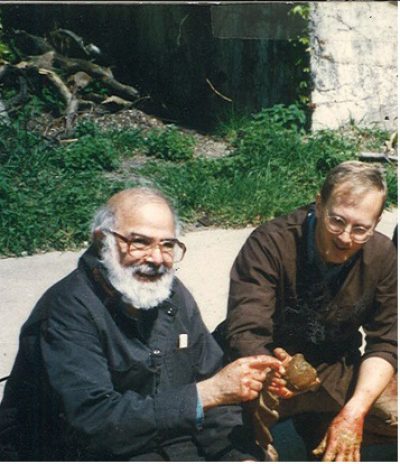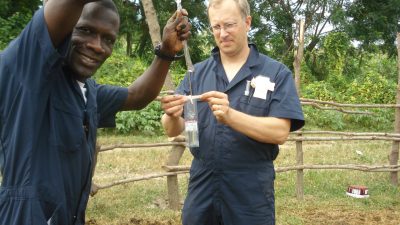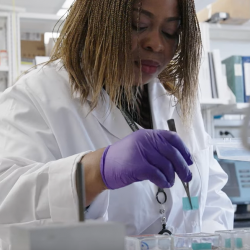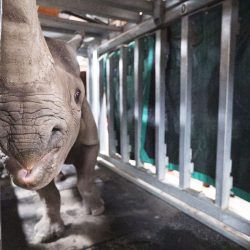In veterinary medicine, international education, outreach, and research are a journey of passion for some. The goal of building common knowledge so that both humans and animals can coexist and flourish with the available resources on this earth can be infectious itself. At the College of Veterinary Medicine (CVM), we have several faculty members who express this passion. My journey did not begin early or as a life-long intention to be involved in international activity, but started after I joined the College and grew into a new-found passion with the help of mentors, collaborators, and, most of all, students.

The seeds for my international career were planted earlier, when I was the senior veterinarian at the Detroit Zoo. While performing a necropsy on an elephant, I met Dr. Jeheskel Shoshani, a professor at Wayne State University. Dr. Shoshani (or Hezy, as everyone called him) was passionate about elephants and had a global perspective –he saw no international borders or divisions, only science and questions to be answered. He devoted his life as an advocate for elephant conservation, establishing the Elephant Research Foundation in 1977.
Hezy was a great mentor, friend, and role model. He loved science and saw the whole world as one. His passion emanated a boyish enthusiasm for science and collaboration, and it inspired me to become more involved in international research. Hezy was also a professor at the University of Asmara in Eritrea and the University of Addis Ababa in Ethiopia. Working with Hezy and his beloved elephants opened the door for me to many zoo and wildlife projects in Africa and Asia. Unfortunately, Hezy was killed in a terrorism-linked explosion in a public bus in downtown Addis Ababa, in 2008.
I believe that MSU is positioned to lead that effort for greater collaborations.
In 2006, I completed my PhD from UC Davis and accepted an assistant professor position at Michigan State University in the College. At that time, I began mentoring a graduate student, Dr. Benjamin Adu-Addai, from Ghana. Intentionally, we made sure part of Ben’s graduate work was done in Ghana. This work was my first effort at research abroad and clearly demonstrated the need for improved sharing of pathology resources around the world.

I believe that MSU is positioned to lead that effort for greater collaborations. This realization led me to join other university and industry colleagues in the development of a digital necropsy platform, originally designed for American feedlot and dairy cattle, but very applicable to enhancing communication between veterinarians in areas like Africa where there is outstanding digital phone and internet service but poor availability of veterinarians. In a few years, I foresee MSU faculty consulting on and enhancing the identification of diseases across Africa and Asia. In just the last few weeks, a laboratory in central Africa connected with me via the Internet and I was able to control their microscope remotely and provide my expertise on a gorilla case from my office in East Lansing. Pretty amazing.
This use of digital technology will help provide faster disease interpretations, empower in-country pathologists and veterinarians who will have a world of consultants available to assist them, and facilitate global collaborations and information transfer. There is an emerging interdependency of climate, agriculture, economy, politics, and diseases (both animal and human). Thus, it is important for us all to problem solve together and work toward a solution for the greater good.
I have learned the importance of developing international partnerships if we want to successfully manage, treat, and prevent global diseases in animals and people.
Closer to home, I have taught a course in international veterinary medicine as an elective for veterinary students. This course has allowed students to learn what it is like to be a global veterinarian from all aspects of the profession. Various speakers, most of whom are from MSU, present their experiences, passions, and challenges working internationally. I hope this course creates similar networking tools and resources as my late mentor, Dr. Hezy Shoshani, provided for me, while keeping his passion for science and love for all life alive.
One example of our international study success is Scott Kramer, a previous student. He proposed a project in Uganda during the semester and brought his ideas to Africa. Working with Veterinarians Without Borders this past summer, Scott implemented training programs for swine butchers and veterinarians in Uganda with another student, Kendra Andrie.
Through many collaborations with colleagues and students at MSU and abroad (far too many to name), I have learned the importance of developing international partnerships if we want to successfully manage, treat, and prevent global diseases in animals and people. My goal as a professor is to educate, guide, assist, and mentor those that have similar passions either at MSU or abroad, making this a smaller and better world.
–Dalen Agnew, DVM, PhD



